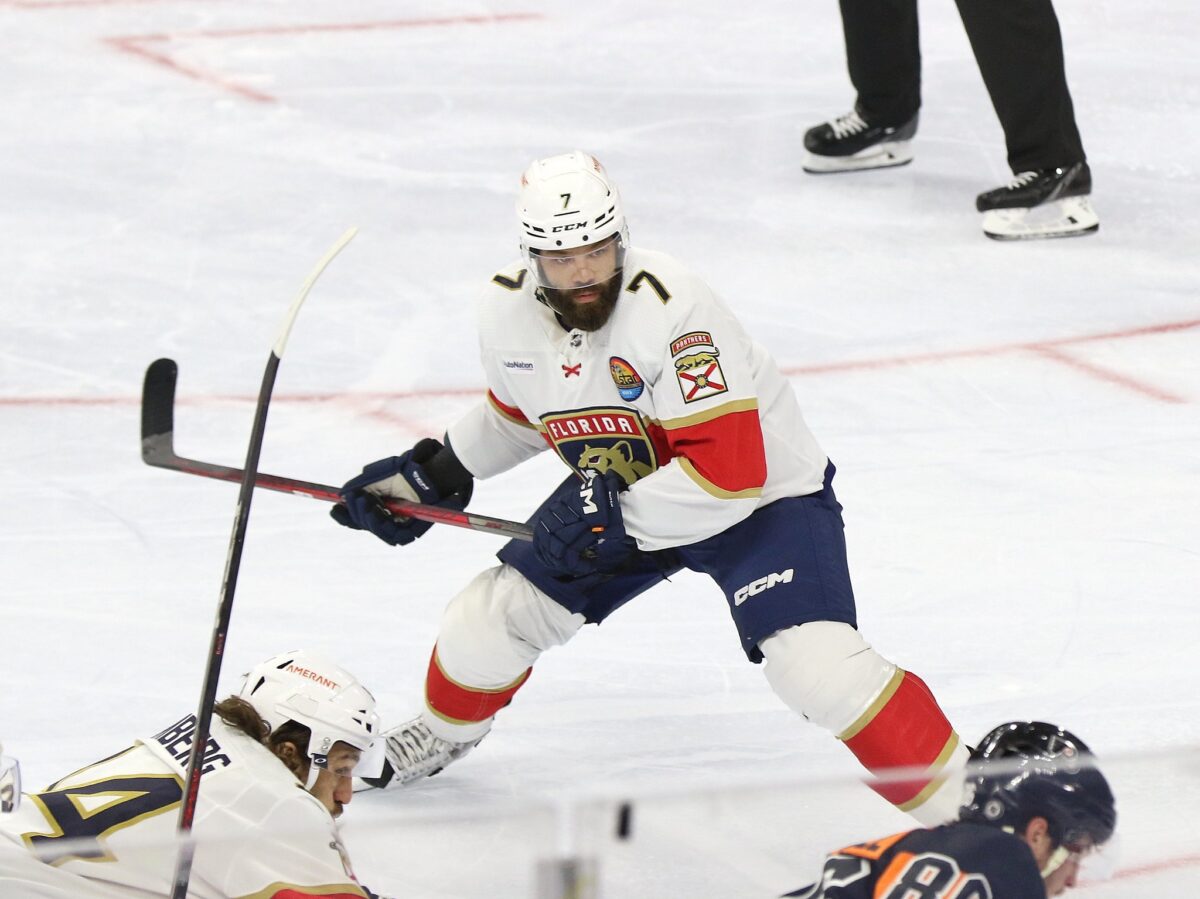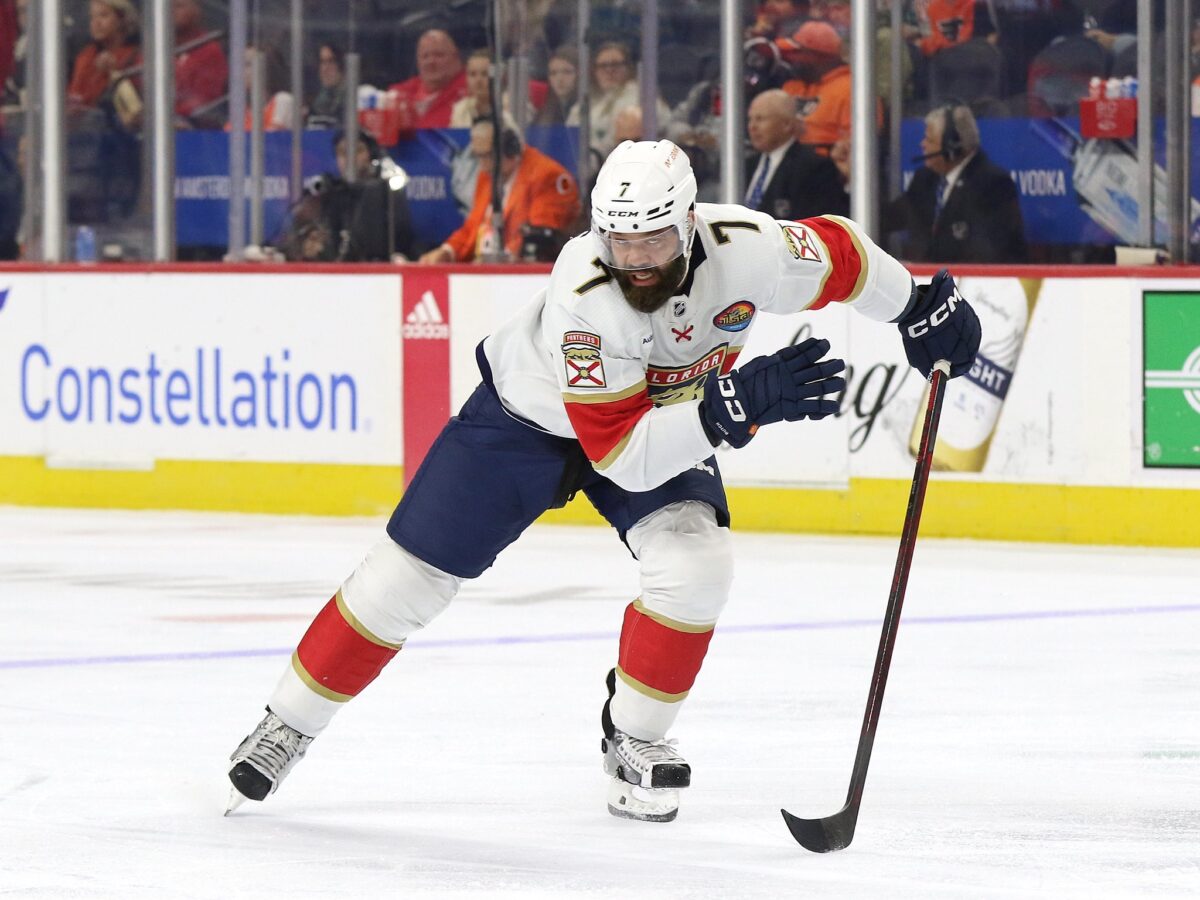When a player signs up to play in Toronto, being in the NHL becomes more than just about playing the game on the ice. It also becomes about the media spotlight (and pressure) that shines on players – daily. Earlier this week, 33-year-old Czech defenseman Radko Gudas recently caused a stir by noting that he had turned down offers and spurned interest in signing him from Canadian teams.
He reported that the Maple Leafs had come calling, but he refused to pick up the phone. The reason? Too much pressure on players because intense media attention comes with playing in a market like Toronto. Gudas, instead, signed a three-year deal with the Anaheim Ducks for $4 million per season.
Gudas Made a Wise Decision for Several Reasons
There are all sorts of angles to this story. It’s an interesting and probably honest stance for Gudas to take. My experience covering the Maple Leafs for six seasons suggests that he’s correct. There is media and fan intensity on NHL players donning the Blue & White.
Second, there’s every good reason for a non-Torontonian to not want to play in this city. And, if you can choose, playing closer to Disneyland in sunny California is not a bad choice.
Third, a number of the comments about Gudas’ decision on social media are accompanied by a tweeted photo of Gudas leaning over the young Maple Leafs’ goalie Joseph Woll literally screaming and taunting him after he could not stop the series-winning goal when the Florida Panthers ousted the Toronto-based team.
Related: Jake Gardiner Leaves the Maple Leafs: Why I’m Glad He’s Gone
On the face of it, it seems more than a bit ironic for a player who publicly admits to wanting to avoid pressure and intensity to bring such pressure and vitriol to his own game at that one defining moment.
Gudas Is Correct About the Intensity Leveled on Player Performance in Toronto
Playing in a media-intense market like Toronto means players face constant scrutiny from journalists (although most Maple Leafs’ writers really do like this team, I believe) and fans. This heightened attention can (a) put enormous pressure on players to perform at an elite level consistently and (b) bring down a rain of critique upon players who don’t. Fans’ expectations for players can be exceptionally high, leading to criticism and hostility if expectations are not met.

Some players find this pressure motivational. It drives and pushes them to excel. For others, it carries added stress and anxiety. It can eat a player – a person – up and affect their mental well-being and on-ice performance. On one hand, I understand Gudas’ choice to play in a less intense media market like Anaheim. It might allow him to focus on his game without the distraction of media and fan critique.
Your Personal Life Is Not Your Own in Toronto
When you play in Toronto, the spotlight extends beyond the rink. Some players are sort of wired for it. It impacts one’s personal life. If you are Mitch Marner at a wedding, you just take your shirt off and eat it up. He doesn’t seem to care about having less privacy in his off-ice activities.
That might change as he ages, but for right now, it’s simply part of his joyful life. By contrast, playing in a less intense market gives players the chance to maintain a more balanced and private lifestyle. That might matter more when children are part of a family (think John Tavares). But, then, Tavares is different as well.
Related: Derek “Turk” Sanderson: A Boston Legend
All this obviously was crucial in Gudas’ consideration. He values the ability to lead a less scrutinized life with a more supportive (or less caring) fan base. Good on him. He’s allowed to make that choice to play in a less intense environment.
Connecting Gudas’ Behavior With His Decisions
Gudas’ choice drew the expected reaction; and on one hand, it proves his point. However, equally as interesting is that many of the comments about his choice came adorned with a tweeted photo of Gudas screaming in the face of Maple Leafs’ goalie Woll after his then-Panthers scored the series-winning goal.
The taunting behavior Gudas displayed seems ironic in light of his stated desire to avoid the personal pressure of playing in Toronto. He wants to avoid it, but he also doesn’t mind bringing it on to others. Interesting, right?
On one hand, his screaming and taunting of Woll indicate his intense competitiveness and desire to win high-stakes games. It also is about the instant release of emotional tension that accompanies this situation. However, it also suggests that he’s emotionally reactive and struggles to control his emotions in critical moments in a professional way.
Related: Anaheim Ducks Sign Radko Gudas to 3-Year Deal
It’s the same reason that many fans simply adore Matthew Tkachuk and would love to have him wear the Blue & White Maple Leafs jersey. He’s intense and cares. That he crosses the line repeatedly is actually appealing to some fans.
Perhaps when considering Gudas, one can separate the difference between on-ice pressure (which he seems to believe is OK) and off-ice pressure (which he seems eager to avoid). Gudas might thrive on the competitiveness and pressure of the game itself, but he does not want the non-stop media and fan attention that come with playing in a media-intense market like Toronto.
Again, from my perspective, Gudas is free to make a personal decision that involves lifestyle preferences, team geography, and financial considerations. Go for it.
Gudas’ Engagement in Reactive Hypocrisy
However, for me, the bigger picture in this story is how human it all is. When I considered Gudas’ stated reasons for the choice of where he’ll play, combined with his on-ice screaming at Woll after the series-winning goal, as well as the Toronto-based fans’ and writers’ reactions to Gudas, it reminds me of the tendency of many people to engage in the very behaviors they claim to dislike or oppose. I see it often.

In fact, it’s such a common behavior that there’s a psychological term for the phenomenon. It’s called “reactive hypocrisy.”
Reactive hypocrisy refers to the tendency for people to criticize the behaviors of others while engaging in the same behaviors themselves. These people seem easy to forgive their own behavior and are able to justify why their actions are acceptable. Yet, they condemn similar actions in others.
Both Gudas and Maple Leafs Fans Have Engaged in Taunting
In this story about Gudas and the reaction of Maple Leafs’ fans, Gudas wants to avoid the pressure of playing in Toronto. Yet, he gives it good to Woll.
At the same time, Maple Leafs’ fans point to the ironic flaw in Gudas’ thinking. He wants to avoid what he’s willing to give. Yet, they too are guilty of taunting Gudas for taunting Woll.
Related: Joseph Woll’s Return Carries New Maple Leafs’ Goalie Issues
It’s sort of a non-stop circle. The fans rightfully point to Gudas’ taunting; but, at the same time, they are proving his point about playing in Toronto. They might condemn taunting when they are the target of it or when it’s done by others (to Woll) against their team, but they also rationalize or downplay their own taunting when it comes to even their own players.
The Bottom Line
I’m not so certain many of us are really that self-aware about how our actions impact players. That seems to be especially true about recent defensemen who have played in Toronto. I’m thinking of players such as Nikita Zaitsev, Cody Ceci, Jake Gardiner, and the recently-departed Justin Holl. By the way, Gudas is a defenseman.

Gudas – for whatever his reason – has made a wise choice in heading for California, where fans might be less interested in the Ducks than they are in the beaches. At the same time, while he’s no angel in this situation, Gudas points to a truth about playing in Toronto. There’s a lot of taunting going on.
His was up close and (literally) in your face. But fans also engage in taunting – now of a soon-to-be Duck, but also of their own players. Their taunting is just a bit more hidden in the crowd.
Gudas is right. There can be a lot of pressure playing in Toronto.
